
E-E-A-T is Google's way of taking all of the signals they have available to them to determine whether you are known as a go-to source for your topics. In this post we'll explore using LLMs to learn more about your E-E-A-T, and better yet, get inspiration on how to improve upon it.
When it comes to being recommended by AI tools like ChatGPT and Gemini, or in many cases, in AI Overviews, E-E-A-T seems to be important. (I say "seems to be" because some sites recommended in AI Overviews do not appear to have E-E-A-T just yet. I think this will change as the system continues to learn.) LLM tools like to recommend brands or people who are known as a go-to source as well as official sources of information.
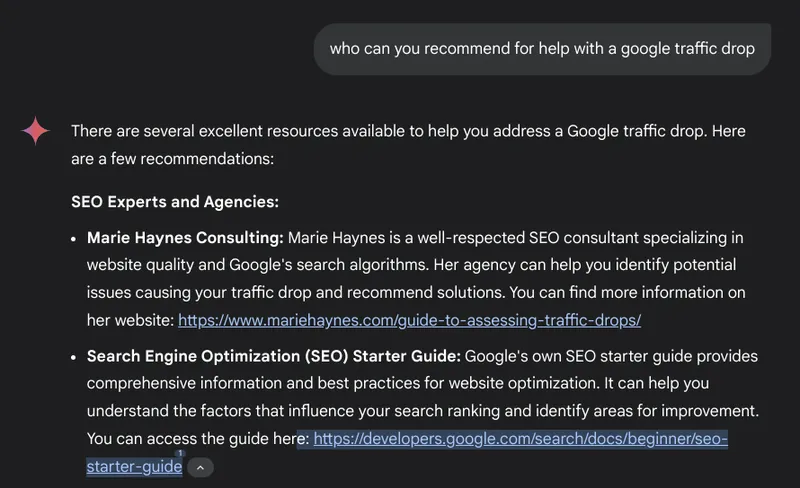
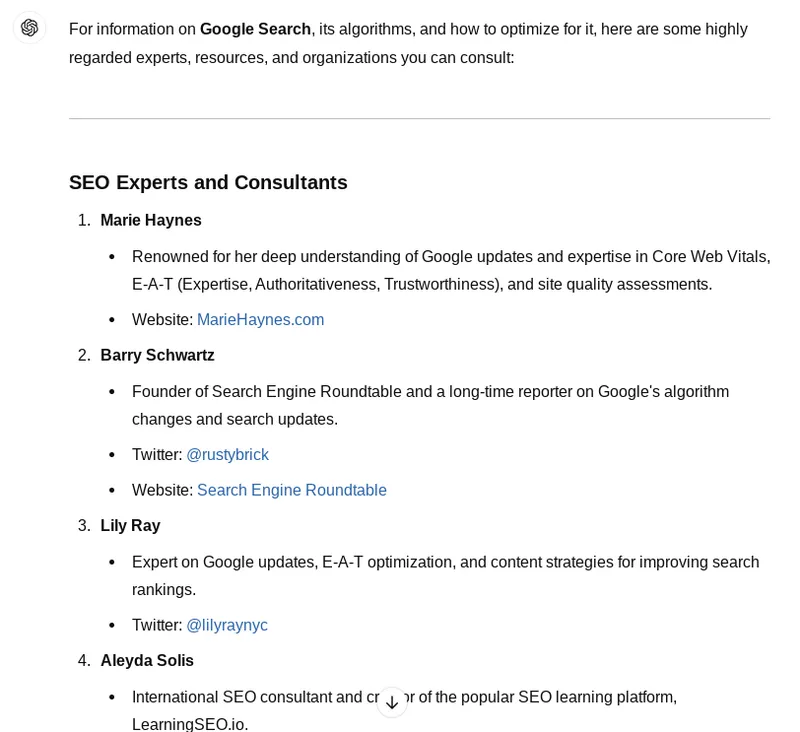
Back in 2018, Google's Gary Illyes confirmed that E-A-T was primarily based on links and mentions on authoritative sites.
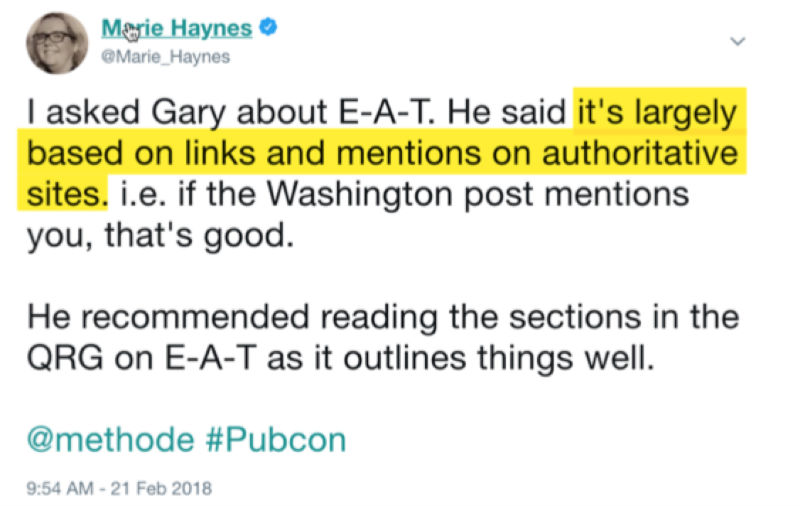
Links are important! However, you are not likely to be able to build E-E-A-T by creating your own links. Rather, you will need to find ways to get the online world truly talking about you and recommending your business and the content you produce. This is no easy task...unless, you are truly creating things that people legitimately want to recommend.
Building E-E-A-T is synonymous with building a reputation for your topics.
Here's something I'd recommend doing. Search through the quality rater guidelines for the phrase "reputation for the topic". You will see example after example of websites that are considered high quality because they are known for their topics.

It's likely that no amount of creating your own links will convince Google, Gemini or ChatGPT that you are a go-to source for information on meningitis. Rather, if you want to be known as a go-to source on this topic, you need to litter the web with indications that you actually ARE a source which people truly recommend....which for the topic of meningitis would be close to impossible. But there likely are topics for which you could conceivably be known as a go-to source.
So, let's brainstorm a little on how to become recognized as a go-to source for your topics.
Use Gemini and ChatGPT to determine what you are known for
Try this prompt in both LLMs:
What is [your name, your business name or your brand name] known for? List 5 topics.
If you have a common name, you may need to say something like, "Marie Haynes, the SEO". If the tools don't recognize you, you have work to do in getting known!
If you are recognized, do the topics listed align with what you or your client want to be known for? If not, I'll share some ideas in a moment on how to change this.
Use Gemini in AI studio to analyze your anchor text
This is a pretty cool exercise to do. I've found it works much better using the Gemini 2.0 Flash Experimental model in Google's AI Studio rather than ChatGPT for this. It's free to use this model. It is so good!
You will need access to a tool like Ahrefs or Semrush that allows you to export your links along with their anchor text. Also, this really only works if you have legitimate mentions rather than links that you purposely made and dictated the anchor text for. As a reminder, creating links for the primary purpose of manipulating rankings is considered spam by Google.
Why look at anchor text? The original PageRank paper tells us that "anchors often provide more accurate descriptions of web pages than the pages themselves." Google has told us that PageRank has evolved a lot since its original use so we don't know whether they are still using anchor text to help label how others are describing pages. I think it's still quite important. The rater guidelines talk extensively about the importance of what others, especially experts have to say about a website.
While I think we can learn a lot from our anchor text, in today's search systems there are a multitude of signals that Google considers that extend beyond PageRank. Still, the anchors of links pointing to our site can give us some indication of what terms people are using when talking about our business and recommending our website.
Upload your link spreadsheet to Gemini and try this prompt:
Prompt: Here is a spreadsheet showing links to my site. Can you help me determine which topics the site is most known for by looking at the anchor text of links?
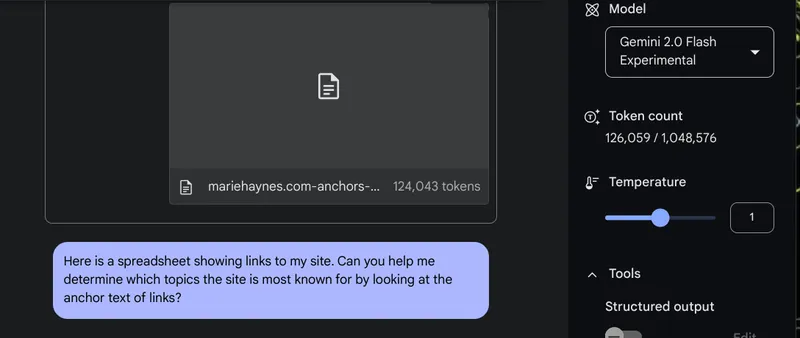
You should really find that brand mentions are at or near the top of the list. If you have not yet read this patent on quality scores (although it’s old now), it shares just how important it is to have a brand that people search for and is associated with your topics.
Here's part of Gemini's analysis of what the anchor text of links pointing to me shows.
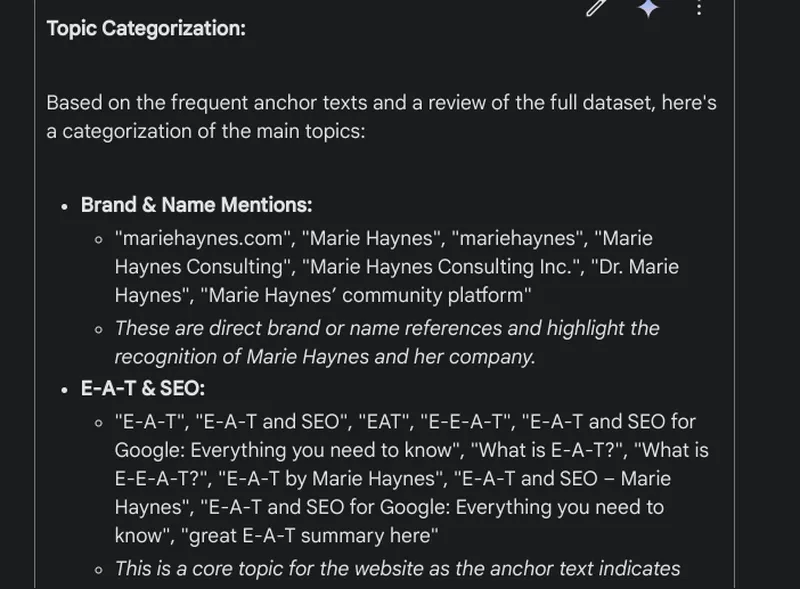
And here is how Gemini summed up what the words used in the anchor text of links pointing to my site say about me.
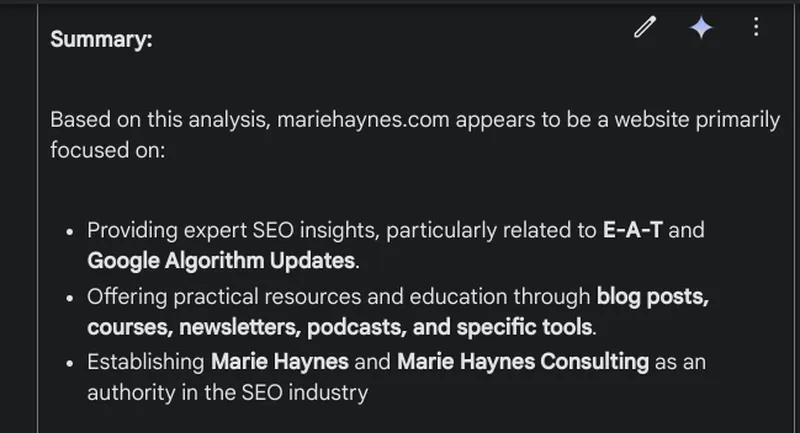
I think this is pretty accurate. I'm known for understanding (E)-E-A-T and Google algorithm updates. I have a well known newsletter, podcast and courses. And my company is recognized as an authority. Good stuff!
However, there is more I want to be known for. Which leads me to my final point...
What if we want to be known for more topics?
It's cool that I am known for these topics, but if you've been following my work lately, you'll know my focus is shifting. I can't stop talking about using AI. I'm freakishly excited about how the use of Agents will be adopted by businesses and transform how we communicate with each other. (If you have not read Google's Whitepaper on Agents, I'd highly recommend it!) And I am obsessed with thinking on how the future will change because of AI.
The problem though is that most of my writings on this topic have been in my paid version of my newsletter, Marie's Notes, which means it's not available on the public web.
If I want to get known for these topics, my goal should be to create a reputation for them. This involves publishing content that others find helpful and link to, and doing more to get publicly known as someone who talks on these subjects. This might mean speaking at conferences on AI or going on podcasts specifically talking about these subjects. This will produce more evidence in the online world that my name is associated with these topics.
You can also try asking Gemini:
I want to also be known for understanding AI, especially the use of LLMs. How can I improve my EEAT in this area?
You'll get loads of ideas.
Oh, and I should write more blog posts that talk about using AI...helpful ones that people mention and link to...like this one. 😛
This post started off as an entry in Marie's Notes. If you enjoyed this story, you'll get great value out of my notes where I dissect all of the latest developments important to Search and AI.



Comments are closed.